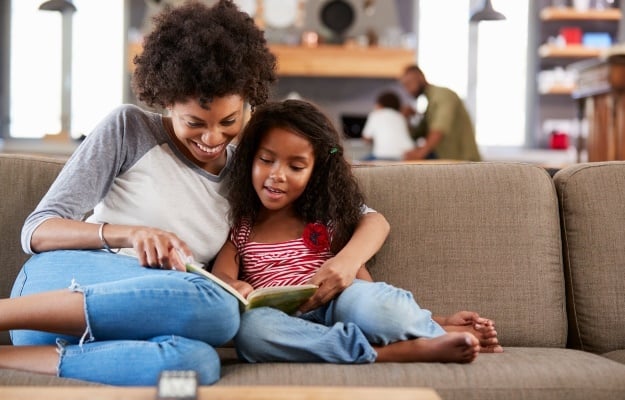
SA came out dismally in a recent global literacy survey – but there’s a lot parents can do to foster a love of reading in children.
Terrible. Shocking. A total fail. The report card is in and parents and educationalists are reeling. How is it possible that 78% of our Grade 4 pupils are unable to read? This is the sickening finding of a recent global study into literacy at South African schools. Put simply, almost eight in 10 SA children don’t understand what they’re reading, if they’re able decode individual words at all.
This means that in terms of the recent Progress in International Reading Literacy Study (PIRLS) – a survey of literacy levels in 50 countries – South African Grade 4s’ reading ability is by far the worst in the world. The local tests for the study were con-ducted by University of Pretoria researchers at the Centre for Evaluation and Assessment (CEA) with each child assessed in the language with which they were most familiar. But it made no difference.
The majority could hardly understand a word of what was in front of them. Unable to achieve even the most elementary benchmark in the test, South African Grade 4s were the worst per-formers while learners from Singapore, the Russian Federation and Northern Ireland were the best.
While the results have sparked heated debate among local education experts they all agree on one thing: it’s devastating news. “Being able to read is the key to academic and future success,” says Celeste Combrinck, CEA’s acting director. “If you can’t read, your opportunities in school or after school will be limited, which is why reading should start at a very young age.”
Although there are many reasons for the literacy crisis experts believe there’s one that can no longer be ignored: Grade R to Grade 3 teachers simply don’t know how to teach reading.
“Reading methods are inconsistent or inefficient and the foundation skills aren’t appropriately laid in the early of school,” Johannesburg-based educational psychologist Melanie Hartgill says.
“There’s a lot of rote learning, with the entire class being expected to say the same things at the same time, repeating a teacher, but they can’t read independently.” Erine Botha, a reading therapist at a Cape Town branch of the Tina Cowley Reading Centre, believes the problem starts far earlier than the Grade 4 year.
“There’s too much focus on assessment rather than skills development and proper teaching, especially in Grade 1,” she says.
How to get them to love reading
From before Grade R your children should be read to every day. From Grade 2 they should be reading independently daily. They should also still be read to by someone else as this exposes them to more advanced vocabulary and concepts, educational psychologist Melanie Hartgill says.
Tips for busy parents
Let older siblings or grandparents read to your child. Play them audiobooks in the car or at home. Make it a ritual to read a book with them every night before they go to bed.
Sign them up at your local library and take them every fortnight to exchange books. Get them involved with reading groups or library reading circles – this will be of particular help if their first language isn’t English.
Enrol your child in a professional reading programme like the Tina Cowley Centre or Wise Eye Reading Academy (both run nationally), reading therapist Erine Botha advises.
Tips for reading with your child
Before starting to read:
Choose a book both of you will enjoy, Hartgill advises. Choose stories with interesting characters and good dialogue. Create a relaxed atmosphere.
While reading aloud:
Read slowly and clearly but naturally. Create a mood by changing the volume and pitch of your voice. Use humour and laugh at funny passages. Encourage questions and discussions. Share personal thoughts about the pictures and story. Offer additional information and explain key concepts and new words, but don’t spoil the story.
After reading aloud:
Ask the child a few questions about the story but not in a heavy-handed way. Encourage the child to ask questions about the story. Let the child retell the story briefly. Relate the story to the child’s real-life experiences. Share personal likes and dislikes and emotional reactions to the story.
What not to do:
Don’t make reading a chore that has to be done for a certain amount of time every day. Don’t tie your opinion of your child to their reading ability and then communicate this through your attitudes and behaviour. Don’t push children to read at a higher level than they’re comfortable with. Don’t bribe your child to read.
Apps for reading excellence
Kid Mode: Free Learning Games
Free on Android for Grades R-3. Familiar cartoon characters from Disney, Thomas & Friends, Teletubbies and Winnie the Pooh help children learn the alphabet and give them basic reading skills, keeping them engaged while making learning fun.
StoryKit
Free on iOS for Grades 1-4. An app with four beautifully illustrated classic stories. After reading them kids can alter the stories or provide their own illustrations and pictures, teaching them valuable lessons in reading and creative writing.
Sight Words List
Free on iOS for Grades R-2. This app has 315 sight words broken down by age. You can select the words you want your child to learn and record them with your own voice. The app also allows you to create your own word lists as your child’s skills improve.
WHAT PARENTS CAN DO
Ensure your children have reached the following literacy levels by the time they’ve completed their first year at school until they reach Grade 4:
GRADE R: By the end of the year your child should be able to name the basic colours, say the alphabet, know the names and sounds of letters, recognise their own name in writing, know which way round to hold a book and that we read from left to right, and have an interest in books.
TIP: As they get older let them write their name on paper, a board, in the sand or with magnetic letters. Read to and with your child. Initially follow the words with your finger so they understand how we read and that what you’re saying is linked to the marks on the page. Encourage them to talk about pictures in books and ask them to predict what comes next in the story.
GRADE 4: By the end of the year children should be confident, sophisticated readers. They should be able to use root words (ones that are the basis for other words, such as “act” in “action”), context clues, which involves looking for clues in the surrounding text and images in the story, and word endings (common suffixes such as -ed, -ful, -ly and -ing) to figure out new words.
They should be capable of spending an hour on their own reading and writing. By this stage they should be able competently to make use of research tools such as a dictionary, encyclopaedia, library and the internet, and to gather information independently on a topic. They must not only understand the text but be able to unpack it to isolate the key points so they can use it to compile an essay or oral of their own.
Eyesight and learning difficulties
Grade R and again in Grades 1 and 2, educational psychologist Melanie Hartgill says. If this isn’t offered at school parents should arrange independent testing. “Visual difficulties with reading are about more than just whether the child can see – they also need to be able to track and scan correctly. All of this needs to be properly assessed.”
Early signs of dyslexia can be picked up in Grade R, Hartgill says, but a formal diagnosis can be made from Grade 2 if the child has shown a poor response to any intervention.




 Publications
Publications
 Partners
Partners
















